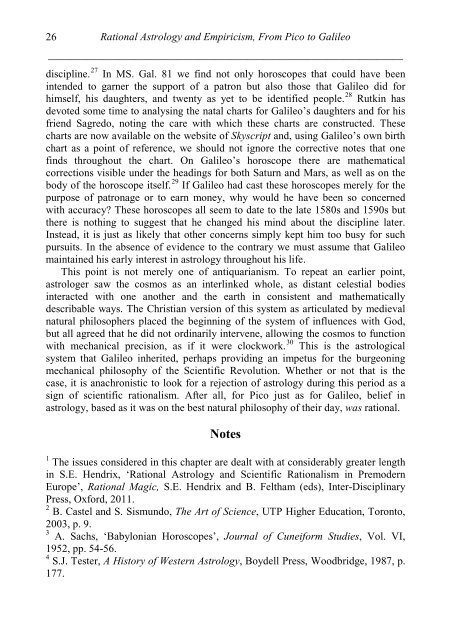Magic and the Supernatural - Lancaster University
Magic and the Supernatural - Lancaster University
Magic and the Supernatural - Lancaster University
You also want an ePaper? Increase the reach of your titles
YUMPU automatically turns print PDFs into web optimized ePapers that Google loves.
26<br />
Rational Astrology <strong>and</strong> Empiricism, From Pico to Galileo<br />
__________________________________________________________________<br />
discipline. 27 In MS. Gal. 81 we find not only horoscopes that could have been<br />
intended to garner <strong>the</strong> support of a patron but also those that Galileo did for<br />
himself, his daughters, <strong>and</strong> twenty as yet to be identified people. 28 Rutkin has<br />
devoted some time to analysing <strong>the</strong> natal charts for Galileo’s daughters <strong>and</strong> for his<br />
friend Sagredo, noting <strong>the</strong> care with which <strong>the</strong>se charts are constructed. These<br />
charts are now available on <strong>the</strong> website of Skyscript <strong>and</strong>, using Galileo’s own birth<br />
chart as a point of reference, we should not ignore <strong>the</strong> corrective notes that one<br />
finds throughout <strong>the</strong> chart. On Galileo’s horoscope <strong>the</strong>re are ma<strong>the</strong>matical<br />
corrections visible under <strong>the</strong> headings for both Saturn <strong>and</strong> Mars, as well as on <strong>the</strong><br />
body of <strong>the</strong> horoscope itself. 29 If Galileo had cast <strong>the</strong>se horoscopes merely for <strong>the</strong><br />
purpose of patronage or to earn money, why would he have been so concerned<br />
with accuracy? These horoscopes all seem to date to <strong>the</strong> late 1580s <strong>and</strong> 1590s but<br />
<strong>the</strong>re is nothing to suggest that he changed his mind about <strong>the</strong> discipline later.<br />
Instead, it is just as likely that o<strong>the</strong>r concerns simply kept him too busy for such<br />
pursuits. In <strong>the</strong> absence of evidence to <strong>the</strong> contrary we must assume that Galileo<br />
maintained his early interest in astrology throughout his life.<br />
This point is not merely one of antiquarianism. To repeat an earlier point,<br />
astrologer saw <strong>the</strong> cosmos as an interlinked whole, as distant celestial bodies<br />
interacted with one ano<strong>the</strong>r <strong>and</strong> <strong>the</strong> earth in consistent <strong>and</strong> ma<strong>the</strong>matically<br />
describable ways. The Christian version of this system as articulated by medieval<br />
natural philosophers placed <strong>the</strong> beginning of <strong>the</strong> system of influences with God,<br />
but all agreed that he did not ordinarily intervene, allowing <strong>the</strong> cosmos to function<br />
with mechanical precision, as if it were clockwork. 30 This is <strong>the</strong> astrological<br />
system that Galileo inherited, perhaps providing an impetus for <strong>the</strong> burgeoning<br />
mechanical philosophy of <strong>the</strong> Scientific Revolution. Whe<strong>the</strong>r or not that is <strong>the</strong><br />
case, it is anachronistic to look for a rejection of astrology during this period as a<br />
sign of scientific rationalism. After all, for Pico just as for Galileo, belief in<br />
astrology, based as it was on <strong>the</strong> best natural philosophy of <strong>the</strong>ir day, was rational.<br />
Notes<br />
1 The issues considered in this chapter are dealt with at considerably greater length<br />
in S.E. Hendrix, ‘Rational Astrology <strong>and</strong> Scientific Rationalism in Premodern<br />
Europe’, Rational <strong>Magic</strong>, S.E. Hendrix <strong>and</strong> B. Feltham (eds), Inter-Disciplinary<br />
Press, Oxford, 2011.<br />
2 B. Castel <strong>and</strong> S. Sismundo, The Art of Science, UTP Higher Education, Toronto,<br />
2003, p. 9.<br />
3 A. Sachs, ‘Babylonian Horoscopes’, Journal of Cuneiform Studies, Vol. VI,<br />
1952, pp. 54-56.<br />
4 S.J. Tester, A History of Western Astrology, Boydell Press, Woodbridge, 1987, p.<br />
177.

















